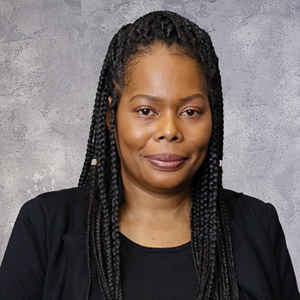Climate Action Fellows 2023 - 2024

Karina Lopez (She/Her/Ella)
B.A in International Relations
Mobilizing Youth Through Education
We now know that the largest contributor to climate change is the fossil fuel industry. Our reliance on fossil fuels has created an issue that threatens our very existence and life on this earth. It often seems like the fossil fuel industry has a chokehold on our government and those abroad, preventing them from passing the type of legislation we need to begin to transition away from fossil fuels into clean energy. Throughout history we have seen many movements create power from the ground up. The climate justice movement is one I believe is key to adequately addressing climate change. For my project, I aim to create a coalition of schools, students, and educators throughout California who will actively push for a climate justice curriculum to be taught in schools.

Taraisa Keeton
M. A. in Family and Consumer Science, Apparel Design & Merchandising
The Ultimate Upcycle
Through this Climate Action Fellowship, I intend to upcycle secondhand garments from thrift stores, such as Goodwill, and create new garments and accessories. Over 85% of textiles end up in landfills, equating to about 11.3 million tons from Americans alone (Igini, 2022). Secondhand clothing business like the Goodwill collect millions of garments per year in an attempt to prevent them from going to landfill but the amount of waste continues to increase. The majority of people lack interest in pre-worn clothing because the quality diminishes over time and the styles become outdated. However, if the clothing was used as a textile to create new designs and timeless pieces, rather than being sold as-is, more individuals would purchase pre-used clothing and we could divert millions of garments from emitting harmful greenhouse gases as they rot in landfills worldwide.

Alyssa Miller (She/Her)
M.S in Integrative Biology
Characterizing leaf and floral trait adaptation to climate in California Clarkia species
The water and carbon cost of flowers are critical components of plant performance that have largely been overlooked in vegetation models. I propose to increase our understanding of plant trait-climate relationships by characterizing the coordination between leaf and flower traits of sister taxa in the genus Clarkia and their relationship with climate. Clarkia is a genus of California annual wildflowers with many species that can be found in a wide range of ecosystems throughout the state. As such California Clarkia species represents a model system for evaluating the impact of climate on leaf and flower traits. Quantifying how leaf and flower functional traits of recently diverging Clarkia vary across an environmental gradient, will be a first step toward building a functional trait dataset that spans multiple dimensions of plant resource allocation providing a better understanding of species sensitivity to climate change.

Jessica Solis (She/Her/Ella)
M. A. in Geography: Resource Management & Environmental Planning
Investigating the Impact of Wildfire Disturbance and Microclimate on Carbon and Water Fluxes in a Coastal Fog-Influenced Grassland Ecosystem
My thesis research aims to understand how coastal fog and wildfire disturbances impact carbon and water fluxes in coastal grassland ecosystems, an ecosystem that is highly vulnerable to increased wildfire risk driven by anthropogenic warming. Advancing our understanding of vegetation recovery postfire and the associated carbon dynamics is key to improve climate-adaptive land management. Field research will be conducted in a coastal terrace located in one of the CSU-Natural Reserves, Swanton Pacific Ranch (SPR), in Santa Cruz County. SPR land managers are keen to use science-based decisions to improve carbon sequestration potential at a landscape scale. I will also be developing a burn severity map for the study area, which is exactly the resource needed to link the science to policy.

Monique Scott (She/Her)
Master of Public Health
Combating Climate Change through Community Capacity Building
Climate change will disproportionately impact those with socio-economic disparities existing in the world today. It has been found that sustainable urban agriculture can slow the process of climate change while also reducing carbon emissions that contribute to climate change. Food security can be increased through the creation of systems in which food is grown locally through community partnerships while at the same time educating the community about the benefits of climate change reduction practices through community-building approaches. This climate justice project consists of 3 parts: a needs assessment of the community, development of the intervention using a community participation approach guided by 20 interviews, and pilot testing at 2-4 community participants' residences. Future directions will allow for the submission presentation at a conference and the potential for publication. Such projects will show how gardening can improve food security while combating climate change.

Samantha Walls
B.S in Zoology
The Impacts of Climate Change on Hummingbird Foraging Behavior
Due to climate change, flowering patterns are not matching hummingbird migratory patterns, leading to decreased energy consumption for the bird and decreased pollination opportunities for flowers. Changes in environmental temperature are also changing thermoregulatory demands for hummingbirds. My research project concerns foraging patterns in hummingbirds and how energetics and thermoregulation relate to their food choices. It will examine foraging habits to see how energetically costly climate change is for hummingbirds. My question is ‘Do Annas hummingbirds exhibit time minimizer or energy maximizer foraging behaviors given different thermoregulatory conditions?’. My study will monitor behavior and food preference given different thermoregulatory conditions and costs associated with feeding energetics. I predict hummingbirds will exhibit time minimizer behavior because the increased thermoregulatory demands are energetically costly for hummingbirds. This study is important because it exemplifies the damage climate change can have on the survivability of species.

Imani Ware (She/Her)
B.S in Astrophysics
Off-Grid, Eco-Friendly, Low-Cost, and Resilient Mobile Tiny Home
My project aims to create a low-impact, environmentally conscious, and resilient home using advanced technological systems and human adaptability. The goal is to build a fully functioning, off-grid, and electric tiny home in a self-contained vehicle that can withstand diverse climates on Earth. The design incorporates modular and adaptive features, using repurposed, recycled, and environmentally-safe materials to reduce harmful construction materials and unnecessary waste. The project tests the resilience of homes using renewable resources and adaptable structures, and has the capacity to be transported to various climates to test resiliencies important to climate action. By utilizing renewable energy sources and efficient energy storage, the design aims to improve renewable construction methods and the resiliency of human habitats.